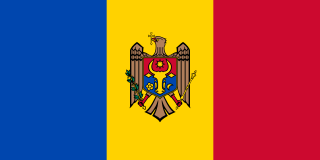
Moldova, officially the Republic of Moldova, is a landlocked country in Eastern Europe. It is bordered by Romania to the west and Ukraine to the north, east, and south. The capital city is Chișinău.

Romania is a country located at the crossroads of Central, Eastern, and Southeastern Europe. It shares land borders with Bulgaria to the south, Ukraine to the north, Hungary to the west, Serbia to the southwest, and Moldova to the east, and has its opening to the Black Sea. It has a predominantly temperate-continental climate, and covers an area of 238,397 km2 (92,046 sq mi), with a population of around 19 million. Romania is the twelfth-largest country in Europe, and the sixth-most populous member state of the European Union. Its capital and largest city is Bucharest, while other major urban areas include Cluj-Napoca, Timișoara, Iași, Constanța, Craiova, Brașov, and Galați.

Romanian is a Balkan Romance language spoken by approximately 24–26 million people as a native language, primarily in Romania and Moldova, and by another 4 million people as a second language. According to another estimate, there are about 34 million people worldwide who can speak Romanian, of whom 30 million speak it as a native language. It is an official and national language of both Romania and Moldova and is one of the official languages of the European Union.
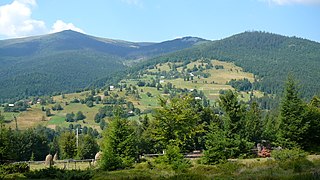
Transylvania is a historical region that is located in central Romania. Bound on the east and south by its natural borders, the Carpathian mountain range, historical Transylvania extended westward to the Apuseni Mountains. The term sometimes encompasses parts of the historical regions of Crișana and Maramureș, and occasionally the Romanian part of Banat.
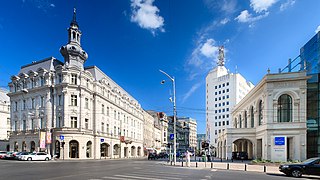
Bucharest is the capital and largest city of Romania, as well as its cultural, industrial, and financial centre. It is in the southeast of the country, at 44°25′57″N26°06′14″E, on the banks of the Dâmbovița River, less than 60 km (37.3 mi) north of the Danube River and the Bulgarian border.

Michael I was the last King of Romania, reigning from 20 July 1927 to 8 June 1930 and again from 6 September 1940 until his forced abdication on 30 December 1947.

The Carpathian Mountains or Carpathians are a range of mountains forming an arc throughout Central and Eastern Europe. Roughly 1,500 km (932 mi) long, it is the third-longest European mountain range after the Urals at 2,500 km (1,553 mi) and the Scandinavian Mountains at 1,700 km (1,056 mi). The range stretches from the far eastern Czech Republic (3%) in the northwest through Slovakia (17%), Poland (10%), Hungary (4%), Ukraine (10%), Romania (50%) to Serbia (5%) in the south. The highest range within the Carpathians is known as the Tatra mountains in Slovakia and Poland, where the highest peaks exceed 2,600 m (8,530 ft). The second-highest range is the Southern Carpathians in Romania, where the highest peaks range between 2,500 m (8,202 ft) and 2,550 m (8,366 ft).

Cluj-Napoca, commonly known as Cluj, is the fourth-most populous city in Romania. It is the seat of Cluj County in the northwestern part of the country. Geographically, it is roughly equidistant from Bucharest, Budapest and Belgrade. Located in the Someșul Mic river valley, the city is considered the unofficial capital to the historical province of Transylvania. From 1790 to 1848 and from 1861 to 1867, it was the official capital of the Grand Principality of Transylvania.
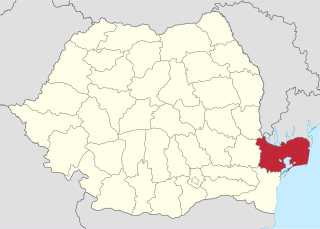
Tulcea County is a county (județ) of Romania, in the historical region Dobruja, with the capital city at Tulcea.

The Kingdom of Romania was a constitutional monarchy that existed in Romania from 13 March (O.S.) / 25 March 1881 with the crowning of prince Karl of Hohenzollern-Sigmaringen as King Carol I, until 1947 with the abdication of King Michael I of Romania and the Romanian parliament's proclamation of Romania as a putative socialist people's republic.

The Romanians are a Romance ethnic group and nation native to Romania and Moldova, that share a common Romanian culture, ancestry, and speak the Romanian language, the most widespread spoken Balkan Romance language, which is descended from the Latin language. According to the 2011 Romanian census, just under 89% of Romania's citizens identified themselves as ethnic Romanians.

Măcin is a town in Tulcea County, in the Northern Dobruja region of Romania.

The Romania national football team represents Romania in international men's football competition, and is administered by the Romanian Football Federation. They are colloquially known as Tricolorii.

The Liga 1, most often spelled as Liga I, is a Romanian professional league for men's association football clubs. It is currently sponsored by betting company Casa Pariurilor, and thus officially known as the Casa Liga 1. At the top of the Romanian football league system, it is the country's primary football competition. Contested by 16 clubs, it operates on a system of promotion and relegation with Liga II. The teams play 30 matches each in the regular season, and then enter the championship play-off or the relegation play-out according to their position in the regular season.
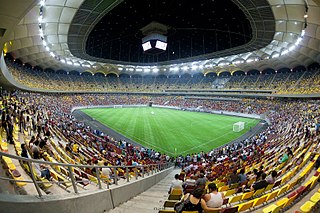
Arena Națională is a retractable roof football stadium in Bucharest, Romania. It opened in 2011 on the site of the original National Stadium, which was demolished from 2007 to 2008. The stadium hosts major football matches including home matches of the Romania national football team, and the Romanian Cup Final. It is the home of FCSB and Dinamo București.

A total of 41 counties, along with the municipality of Bucharest, constitute the official administrative divisions of Romania. They represent the country's NUTS-3 statistical subdivisions within the European Union and each of them serves as the local level of government within its borders. Most counties are named after a major river, while some are named after notable cities within them, such as the county seat.

Elena Alexandra Apostoleanu, known professionally as Inna, is a Romanian singer and songwriter. Born in Mangalia and raised in Neptun, she studied political science at Ovidius University before meeting the Romanian trio Play & Win and pursuing a music career. She adopted the stage name "Alessandra" in 2008 and adopted a pop-rock style; later that year, she changed her stage name to "Inna" and began releasing house music. "Hot" (2008), her debut single, was a commercial success worldwide and topped the Romanian and Billboard's Hot Dance Airplay chart, among others. Inna's debut studio album of the same name followed in August 2009 and was certified Gold and Platinum. It featured several other successful singles in Europe, including "Amazing" (2009), her second number one single in Romania.

Alexandra Ioana Stan is a Romanian singer-songwriter. Born in the city of Constanța, she made her worldwide breakthrough with the 2010 single "Mr. Saxobeat", which was written and produced by Marcel Prodan and Andrei Nemirschi. They had previously discovered Stan at a karaoke bar in 2009 and signed her to their label, Maan Records. "Mr. Saxobeat" had followed the singer's debut single, "Lollipop " (2009), which brought her moderate fame in Romania. "Mr. Saxobeat" quickly achieved commercial success locally and abroad, reaching number one in several countries and gathering various certifications. Saxobeats, Stan's debut studio album, was released in August 2011 and features the follow-up singles "Get Back (ASAP)" (2011) and "Lemonade" (2012), which fared moderately well in Europe.
The 2011–12 Liga I was the ninety-fourth season of Liga I, the top-level football league of Romania. It began on 22 July 2011 and ended on 19 May 2012. The defending champions are Oțelul Galați.



















